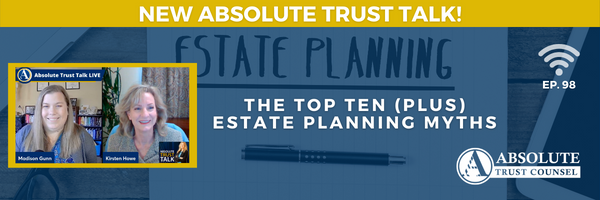Considering what might potentially hang in the balance, logic would suggest that when it comes time to prepare an estate plan, nearly all of us would stick to a “just the facts” approach, steering clear of secondhand and ill-conceived advice from friends or flat-out inaccurate information that’s been handed down from generation to generation. But let’s be honest, estate planning can have its complexities and be confusing, so often, the information we have from our peers might be all we have.
The problem is, when it comes time to put an estate plan into action, it’s usually too late for do-overs. And, if that estate plan is built on faulty information or incomplete follow-through, the financial consequences can be substantial — even life-changing. Hard-earned assets that don’t end up going to the intended beneficiaries, unintentional and seemingly harmless missteps that can result in legal action, and even woefully inadequate medical provisions at a point in life where they’re needed the most.
We totally understand that there is a sense of uneasiness that often surrounds the subject of estate planning. Almost nothing reminds us of our own mortality, like sitting down and strategizing for our pending demise or incapacitation. So instead of putting in the all-important due diligence to get to the bottom of the realities of estate planning — or better yet, soliciting the guidance of a qualified professional — many of us take the path of least resistance and rely on often expedient but faulty information that can bring on those severe consequences down the line.
It’s just too important a topic to rely on shortcuts, so in this episode of Absolute Trust Talk, Kirsten Howe and associate attorney, Madison Gunn, will not only examine some of the most common estate planning myths they’ve encountered in the course of their practices, but will also counter them with the actual legal facts.
These myths will range from thoroughly believable to seemingly irrational. Some you may have even accepted as fact a long time ago, while others might leave you scratching your head in disbelief. But they’ll all have one thing in common — subscribing to them can lead to many problems down the line.
In this episode, we’ll discuss:
- How, despite the best of intentions, lack of follow-through can torpedo major elements of even the best estate plans
- The misunderstandings that surround the concept of common-law marriage (Hint: It’s not even a thing in many states)
- Why irrevocable trusts aren’t the panacea that many believe them to be
- The variety of circumstances that can lead details of your estate plan to be divulged to people you’d rather not know about it
- What is required of an aging parent when it comes time to update their estate plan
- Why estate planning is essential even for those who don’t have heirs or have amassed valuable assets
And more.
With all the misinformation surrounding estate planning that’s circulated over the years, it might be hard at times to separate fact from fiction, but we’re here to help! Join Kirsten and Madison as they clear up some of the most common estate planning myths they’ve encountered during their careers and replace these falsehoods with actual facts.
Big Three from Episode #098:
- When it comes to estate planning, commonly held beliefs are no substitute for facts. Whether you’re in the middle of the process yourself, or plan to look out for the best interests of someone else who is, seeking out the guidance of a qualified attorney who can help you navigate the estate planning landscape is the best way to end up with an estate plan that functions as intended when it’s put to the test.
- Just as we almost universally get a lot of satisfaction from making “to do” lists and then crossing off the objectives that are on it, formulating and writing out an estate plan can provide quite a sense of accomplishment. But, in reality, a good amount of follow through — often over the course of years or even decades — is needed to keep things on course. When significant life changes happen, so should your estate plan.
- In reality, proper estate planning can have profound implications for those who are still very much alive. Taking the time to ask the right questions and then planning accordingly may yield huge dividends for people who are far from death but should still plan for a number of common potential scenarios.
Time-stamped Show Notes:
0:00 Introduction
1:12 You’ve just left your attorney’s office after signing your trust. Think your work is done? It isn’t. Listen in as we discuss the next steps.
3:13 This is an action that Kirsten and Madison recommend to help ensure that your trust stays in alignment with our current tax laws.
3:45 We hear about common law marriages pretty often, and many of us believe that they confer the same protections as a licensed marriage. But that’s not necessarily true.
5:24 Many people believe that irrevocable trusts protect us from creditors and leave us free to spend the trust’s assets as we see fit. This is a fine example of the adage, “If it sounds too good to be true, it is.” We’ll explain.
7:00 While estate plans can often be kept private, there are times when details may be provided to beneficiaries and heirs with awkward consequences.
9:05 Being granted Power of Attorney does confer a number of rights, but it also comes with obligations and limitations. Kirsten and Madison will talk about one situation they see happen often and how it can lead to serious legal consequences.
10:36 If your parent is showing signs of dementia and you feel it’s time for them to update their estate plan, this is what’s required of them in order to move forward.
12:00 An increasing sensitivity to elder abuse has changed how many estate plans are approached. These are the real-life implications of that shift.
13:13 If you bring your parents into an attorney’s office for estate planning, there will likely be a time when you’re asked to step outside. It may seem awkward and even a bit insulting, but it’s necessary. Here’s why.
13:44 Suppose you’re young; you have no children or much in the way of appreciable assets. Here’s why you still need at least a partial estate plan.
14:21 If you’re over the age of 18 but don’t have a healthcare directive, you may find yourself in a sort of medical limbo if you were to become incapacitated. This is why.
14:49 Here’s another potential scenario that can occur if you don’t have a healthcare directive. The Terri Schiavo legal case made the news a while back and is a perfect example.
15:54 Medicare provides essential coverage for everyone in the U.S. who is 65 or older, but here’s where you shouldn’t depend on it.
18:30 Many people confuse memory care and assisted living. This is the one big distinction between the two.
20:30 It’s a common misconception that the state takes all your assets if you die without a will or estate plan. Let’s discuss where some of those assets actually go.
22:33 Think that gifting someone more than $16,000 will trigger a “gift tax”? Not necessarily. Start listening now to learn more about what the IRS really looks at.
24:17 The gift amount requiring a gift tax return has risen sharply of late. This is why the IRS keeps adjusting the limit.
25:34 While California doesn’t recognize common law marriage, it will honor it for citizens of states that do. Here’s why.
27:41 Can you set up a trust that will protect you from creditors?
29:11 Irrevocable trusts may seem appealing because of their protections, which is why many clients decide against them. Confused? Let’s discuss!
31:45 Is that bit of estate planning advice you got from a friend or neighbor legitimately? Ask your trusted attorney!
Resources/Links Mentioned in this Episode:
- Absolute Trust Talk Ep. 033 Learning the Language of Long-Term Care Insurance
- Absolute Trust Talk Ep. 90 Choosing a Trustee – How to Get it Right
- Absolute Trust Talk Ep. 86 Trust Failures: Don’t Let This Happen to You! (Continued!!)
- Absolute Trust Talk Ep. 085 Estate Planning Changes Late in Life: Is It Real or Is It Elder Abuse
- Absolute Trust Talk Ep. 068 What You Need to Know Before Choosing a Medicare Plan
- Absolute Trust Talk Ep. 064 Trust Failures: Don’t Let This Happen to You!
- Absolute Trust Talk Ep. 061 Keys to a Successful Transfer of Wealth
- Absolute Trust Talk Ep. 040 How to Avoid the Most Common Estate Planning Mistake
- Absolute Trust Counsel would love to offer access to our Incapacity Planning resource page: https://AbsoluteTrustCounsel.com/Incapacity-Planning/. We’ve collected our top planning information all in one place so listeners can find videos, guidebooks, blog posts, and a host of information with tips and strategies on implementing, planning, and protecting themselves and their loved ones.
- We’re pleased to provide you with a library of e-books to address common estate planning questions and concerns in practical, easy-to-understand language. https://AbsoluteTrustCounsel.com/Resources/.
- ASK KIRSTEN: If you’d like Kirsten to answer your question on the air, please email her at Info@AbsoluteTrustCounsel.com.
[Ad] Are you a resident of Walnut Creek or the greater East Bay needing help with your estate plan? At Absolute Trust Counsel, your family’s safety is our number one priority. We understand how complicated it can be to know if you’re making the right legacy planning decisions, which is why we’re here to make things easier. Schedule a free discovery call, and let’s talk about how we can help build the right plan for you and your family.
[Ad] The job of a trustee isn’t as easy as one may think. You must give legal notices, retitle assets, file tax returns, understand a legal document, and perform a variety of tasks most people find unfamiliar. As a trustee, if you forget a step or make a mistake, you could be held liable.
Protect yourself, have a plan, and find out the next steps about your specific trust. Get started now by scheduling a 20-minute discovery call with Absolute Trust Counsel. During this introductory call, we will gather information about your trust administration, review our trust administration process with you, and answer any questions you may have. Our goal is to help you get the job done right!



